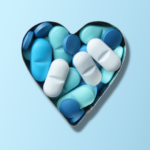Around 1 in 3 Australians have uncontrolled high blood pressure — also known as hypertension. This can affect the blood flow to your organs and increases your chance of developing chronic conditions including stroke, coronary heart disease, heart failure and kidney disease.
Hypertension can also have a significant effect on your sex life. Having high blood pressure comes with an increased risk of experiencing erectile dysfunction — a difficulty getting or maintaining an erection.
What’s the link? Well, in order to get an erection, blood flow into and out of the penis must change. When these changes in blood flow are restricted, erections can be impacted. Over time, high blood pressure can damage the blood vessels, making them more vulnerable to narrowing and plaque build-up, which is called atherosclerosis. This can restrict blood flow to the body’s organs, including — in the case of erectile dysfunction — the penis.
“Hypertension is sometimes a standalone condition and sometimes it’s associated with other conditions, which also impact on erectile function like high cholesterol, diabetes, and being overweight.”
Managing high blood pressure
Hypertension doesn’t often come with obvious symptoms, which is why it’s important to have regular check-ups with your GP to get your blood pressure monitored.
High blood pressure can be controlled by addressing these risk factors with lifestyle changes, as well as medication.
“By improving blood pressure by whatever means it takes — whether that’s losing weight or going on medication — you may improve your erections,” Dr Lowy says.
High blood pressure medication and erectile dysfunction
Some men find hypertension medication can also impact sexual function.
Research has found that diuretics and beta-blockers (except Nebivolol) may influence erectile function. Other medication options such as ACE-inhibitors, angiotensin-receptor-blockers and calcium-channel-blockers are reported to have no relevant or even a positive effect on erectile function.
“If you feel like the medications you’re on might be making your erectile function worse, speak to your doctor,” Dr Lowy says. It’s important not to quit any medications without chatting to your GP as they can help manage your medications to try and improve sexual function, without impacting your overall health.
Always chat to your doctor about erectile dysfunction
Erectile dysfunction can be a sensitive or awkward issue to discuss with your doctor. But given at least one in five men over the age of 40 has an erection problem, and about one in ten men are unable to have erections, you won’t be the first patient to appear in a doctor’s room needing help.
There’s also no age when you’re ‘too old’ to get help with erectile dysfunction and it should be discussed with your doctor whether you want to have sex or not. The link between erectile dysfunction and cardiovascular disease shows that it can be a barometer for your overall health and it could be a warning that there’s something amiss with your ticker well before it takes a turn for the worse.















